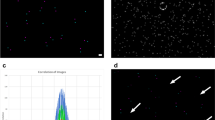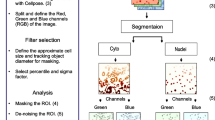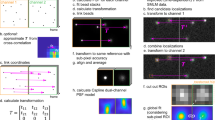Abstract
In microscopy imaging, colocalization between two biological entities (e.g., protein-protein or protein-cell) refers to the (stochastic) dependencies between the spatial locations of the two entities in the biological specimen. Measuring colocalization between two entities relies on fluorescence imaging of the specimen using two fluorescent chemicals, each of which indicates the presence/absence of one of the entities at any pixel location. State-of-the-art methods for estimating colocalization rely on post-processing image data using an adhoc sequence of algorithms with many free parameters that are tuned visually. This leads to loss of reproducibility of the results. This paper proposes a brand-new framework for estimating the nature and strength of colocalization directly from corrupted image data by solving a single unified optimization problem that automatically deals with noise, object labeling, and parameter tuning. The proposed framework relies on probabilistic graphical image modeling and a novel inference scheme using variational Bayesian expectation maximization for estimating all model parameters, including colocalization, from data. Results on simulated and real-world data demonstrate improved performance over the state of the art.
We thank funding via the IIT Bombay Seed Grant 14IRCCSG010 and T. Liou for the data.
Access this chapter
Tax calculation will be finalised at checkout
Purchases are for personal use only
Similar content being viewed by others
References
Adler, J., Parmryd, I.: Quantifying colocalization by correlation: the Pearson correlation coefficient is superior to the Mander’s overlap coefficient. Cytometry A 77(8), 733–42 (2010)
Awate, S.P., Whitaker, R.T.: Multiatlas segmentation as nonparametric regression. IEEE Trans. Med. Imaging 33(9), 1803–1817 (2014)
Awate, S.P., Zhang, H., Gee, J.C.: A fuzzy, nonparametric segmentation framework for DTI and MRI analysis: with applications to DTI tract extraction. IEEE Trans. Med. Imaging 26(11), 1525–1536 (2007)
Batada, N., Shepp, L., Siegmund, D.: Stochastic model of protein-protein interaction: why signaling proteins need to be colocalized. Proc. Nat. Acad. Sci. 101(17), 6445–6449 (2004)
Beal, M., Ghahramani, Z.: The variational Bayesian EM algorithm for incomplete data: with application to scoring graphical model structures. Bayesian Stat. 7, 453–465 (2003)
Bolte, S., Cordelieres, F.: A guided tour into subcellular colocalization analysis in light microscopy. J. Microsc. 224(3), 213–32 (2006)
Chang, M., Sezan, M., Tekalp, A., Berg, M.: Bayesian segmentation of multislice brain magnetic resonance imaging using 3-D Gibbsian priors. Opt. Eng. 35(11), 97–106 (1996)
Costes, S., Daelemans, D., Pavlakis, G., Lockett, S.: Automatic and quantitative measurement of protein-protein colocalization in live cells. Biophys. J. 86(6), 3993–4003 (2004)
Demandolx, D., Davoust, J.: Multicolour analysis and local image correlation in confocal microscopy. J. Microsc. 185(1), 21–36 (2003)
Dunn, K., Kamocka, M., McDonald, J.: A practical guide to evaluating colocalization in biological microscopy. Am. J. Physiol. Cell Physiol. 300, C723–C742 (2011)
Helmuth, J., Paul, G., Sbalzarini, I.: Beyond co-localization: inferring spatial interactions between sub-cellular structures from microscopy images. BMC Bioinf. 11(372), 1–12 (2010)
Jezierska, A., Talbot, H., Pesquet, J., Engler, G.: Poisson-Gaussian noise parameter estimation in fluorescence microscopy imaging. In: IEEE International Symposium on Biomedical Imaging (ISBI), pp. 1663–1666 (2012)
Leemput, K.V., Maes, F., Vandermeulen, D., Suetens, P.: A unifying framework for partial volume segmentation of brain MR images. IEEE Trans. Med. Imaging 22(1), 105–119 (2003)
Lew, M., Lee, S., Ptacin, L., Lee, M., Twieg, R., Shapiro, L., Moerner, W.: Three-dimensional superresolution colocalization of intracellular protein superstructures and the cell surface in live Caulobacter crescentus. Proc. Nat. Acad. Sci. 108(46), E1102–E1110 (2011)
Li, S.Z.: Markov Random Field Modeling in Image Analysis. Advances in Pattern Recognition. Springer, London (2009)
Liu, W., Awate, S.P., Anderson, J., Fletcher, P.T.: A functional networks estimation method of resting-state fMRI using a hierarchical Markov random field. NIMG 100, 520–34 (2014)
Luisier, F., Blu, T., Unser, M.: Image denoising in mixed Poisson-Gaussian noise. IEEE Trans. Imaging Process 20(3), 696–708 (2011)
Manders, E., Verbeek, F., Aten, J.: Measurement of co-localisation of objects in dual-colour confocal images. J. Microsc. 169(3), 375–382 (1993)
Ng, B., Hamarneh, G., Abugharbieh, R.: Modeling brain activation in fMRI using group MRF. IEEE Trans. Med. Imaging 31(5), 1113–1123 (2012)
Oheim, M., Li, D.: Quantitative colocalisation imaging: concepts, measurements, and pitfalls. In: Frischknecht, F., Shorte, S.L. (eds.) Imaging Cellular and Molecular Biological Functions. Principles and Practice, pp. 117–155. Springer, Heidelberg (2007)
Pham, D.L., Prince, J.L.: A generalized EM algorithm for robust segmentation of magnetic resonance images. In: Proceedings of Conference on Information Science and Systems, pp. 558–563 (1999)
Ramirez, O., Garcia, A., Couve, A., Hartel, S.: Confined displacement algorithm determines true and random colocalization in fluorescence microscopy. J. Microsc. 239, 173–183 (2010)
Rizk, A., Paul, G., Incardona, P., Bugarski, M., Mansouri, M., Niemann, A., Ziegler, U., Berger, P., Sbalzarini, I.: Segmentation and quantification of subcellular structures in fluorescence microscopy images using Squassh. Nat. Protoc. 9(3), 586–596 (2014)
Roche, A., Ribes, D., Bach-Cuadra, M., Kruger, G.: On the convergence of EM-like algorithms for image segmentation using Markov random fields. Med. Imaging Anal. 15(6), 830–839 (2011)
Sarder, P., Nehorai, A.: Deconvolution methods for 3-D fluorescence microscopy images. IEEE Signal Process. Mag. 23(3), 32–45 (2006)
Zhang, Y., Brady, M., Smith, S.: Segmentation of brain MR images through a hidden Markov random field model and the expectation maximization algorithm. IEEE Trans. Med. Imaging 20, 45–57 (2001)
Zinchuk, V., Zinchuk, O.: Quantitative colocalization analysis of confocal fluorescence microscopy images. Curr. Protoc. Cell Biol. 62(4.19), 1–14 (2008)
Zinchuk, V., Wu, Y., Grossenbacher-Zinchuk, O.: Bridging the gap between qualitative and quantitative colocalization results in fluorescence microscopy studies. Nature: Sci. Rep. 3(1365), 1–5 (2013)
Author information
Authors and Affiliations
Corresponding author
Editor information
Editors and Affiliations
Rights and permissions
Copyright information
© 2015 Springer International Publishing Switzerland
About this paper
Cite this paper
Awate, S.P., Radhakrishnan, T. (2015). Colocalization Estimation Using Graphical Modeling and Variational Bayesian Expectation Maximization: Towards a Parameter-Free Approach. In: Ourselin, S., Alexander, D., Westin, CF., Cardoso, M. (eds) Information Processing in Medical Imaging. IPMI 2015. Lecture Notes in Computer Science(), vol 9123. Springer, Cham. https://doi.org/10.1007/978-3-319-19992-4_1
Download citation
DOI: https://doi.org/10.1007/978-3-319-19992-4_1
Published:
Publisher Name: Springer, Cham
Print ISBN: 978-3-319-19991-7
Online ISBN: 978-3-319-19992-4
eBook Packages: Computer ScienceComputer Science (R0)




